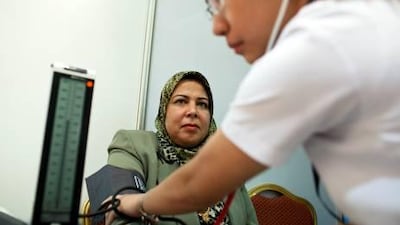DUBAI // Nearly half of all Emirati adults have high blood pressure, and researchers say most of them are not getting adequate treatment.
They estimate that three-quarters of hypertensive Emiratis are likely to develop further complications, possibly leading to increased rates of heart disease and strokes.
Raised blood pressure is responsible for 62 per cent of all strokes and 49 per cent of all heart disease worldwide. It is also the biggest cause of death, and is estimated to kill seven million people annually.
A 10-year study of high blood pressure in the Emirates, now in its third year, is tracking 1,500 hypertensive adults in rural and urban areas.
The Prospective Urban Rural Epidemiology (PURE) study has so far found that 41 per cent of Emirati people aged between 30 and 70 have hypertension, while 19 per cent have pre-hypertension.
“If you look at the world as a whole, approximately 30 per cent have got hypertension and that translates to one billion people,” said Dr Azzan Binbrek, a consultant cardiologist at Rashid Hospital.
“What is surprising to me is that in the UAE, 41 per cent of our population have hypertension. So we have more hypertension here than the rest of the world.”
Dr Afzal Hussein Yusufali, the National co-ordinator for the study and a consultant cardiologist at Dubai Hospital, said: “This is a very long and difficult study, but it is worthwhile. The main aim is to find out which factors cause diabetes and blood pressure.
“One of the worrying statistics we found was that only 66 per cent of the study group with hypertension knew they had the disease, and just 60 per cent were receiving treatment, of which only 38 per cent were benefiting from the medications and had seen their blood pressure lowered to within target levels.”
Dr Binbrek stressed the crucial importance of prevention and treatment of pre-hypertension and detecting high blood pressure through regular screening and awareness.
“When complications arise, treatment is extraordinarily expensive. I would suggest that all students at universities be screened.
Patients should be educated on the need to get treatment to avoid complications,” said Dr Binbrek. “We are doing our best, but our best is not good enough yet.”
Both doctors explained that some lifestyle choices were to blame for high blood pressure, such as high salt intake, lack of fruit and vegetables, excess weight and a lack of exercise.
“When we look at those who are not aware in our population, those who are young males, don’t have a family and less than a primary education are the least likely to come and see us,” Dr Yusufali said.
One problem medical practitioners face when treating patients is getting them to take their medicine.
Dr Binbrek noted that many patients do not continue taking their medication, which makes it difficult to control the condition.
“They need to take their medications indefinitely, not just for one month or one year.
What we have learnt is that many of our hypertensive patients may also have diabetes or heart disease.
They may be prescribed up to seven pills and compliance becomes a problem.”
The doctors said they hoped a new triple combination single pill for uncontrolled hypertension will help to resolve the problem.
The drug was licensed by the Ministry of Health at the end of last year and has just become available at local pharmacies.
balqabbani@thenational.ae

